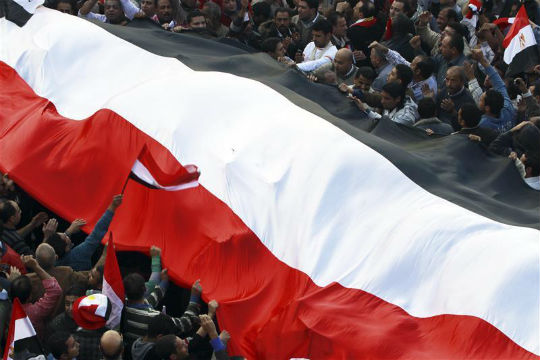Egypt since revolt against Hosni Mubarak

Here is a timeline of events in Egypt since protests against Hosni Mubarak began last year.
Jan. 25, 2011 - Anti-government protests begin across Egypt following the Jan. 14 overthrow of Tunisia's president in the first of a series of Arab uprisings.
Jan. 28 - Mubarak, 82, a former air force commander who has been president since 1981 under a military-backed system of rule in force for six decades, orders troops and tanks into cities to quell demonstrations. Thousands cheer news of intervention of the army, which is widely seen as a neutral force in politics, unlike police who are regularly deployed to stifle dissent.
Jan. 31 - New government is sworn in with former air force commander Ahmed Shafik as prime minister. New vice president, Omar Suleiman, hitherto intelligence chief, says Mubarak has asked him to start dialogue with political forces.
Feb. 4 - Thousands gather in Cairo's Tahrir Square in a "Day of Departure" to press Mubarak to go.
Feb. 10 - Mubarak says national dialogue under way, transfers powers to Vice President Suleiman.
Feb. 11 - Mubarak steps down and a military council led by Field Marshal Hussein Tantawi takes over.
Feb. 22 - Tantawi swears in new cabinet but Muslim Brotherhood and others want it purged of Mubarak's ministers.
March 3 - Prime Minister Shafik resigns and military asks former Transport Minister Essam Sharaf to form cabinet.
March 19 - Big majority of Egyptians approves amendments to the constitution in referendum. The amendments are designed to pave way for parliamentary and presidential elections.
March 23 - Egypt approves law easing curbs that choked political life under Mubarak.
April 8 - Thousands protest in Tahrir Square against delays in putting Mubarak on trial.
Aug. 3 - Mubarak trial opens. Wheeled into a courtroom cage lying on a bed, Mubarak denies charges of ordering the killing protesters and other abuses of power.
Oct. 9-10 - Coptic Christians turn their fury on the army after at least 25 Christians are killed when troops break up a protest. Tension between Muslims and 10-percent Christian minority is not new but has heightened since the revolt.
Nov. 21 - Sharaf's government resigns after more protests in Tahrir Square against the slow pace of "transition".
Nov. 22 - Tantawi promises that a civilian president will be elected in June 2012, six months sooner than planned.
Nov. 25 - Thousands demanding an end to military rule pack Tahrir Square in the biggest turnout of a week of protests in which 42 people were killed. The military council names Kamal al-Ganzouri to head a government of national salvation. He had served as prime minister under Mubarak from 1996 to 1999.
Nov. 28 - First voting in parliamentary election.
Jan. 3-4, 2012 - Third and final round of legislative election. Muslim Brotherhood's Freedom and Justice Party take more than two fifths of the seats, followed by an ultra-orthodox Salafi Islamist party with more than a fifth.
Jan. 16 - Egypt says it has asked the IMF for $3.2 billion to help to fill a budget gap widened by almost a year of political and economic turmoil.
Jan. 23 - New parliament holds its first session.
April 17 - Ten candidates disqualified from the presidential race, including Omar Suleiman and Muslim Brotherhood's Khairat al-Shater. Brotherhood fields reserve candidate Mohamed Morsy.
May 23 and 24 - First round of presidential election.
May 28 - Morsy and Shafik declared the runoff candidates.
June 2 - Mubarak is sentenced to life in prison for his role in the killing of protesters.
June 13 - Egypt issues a decree allowing military police to detain civilians, a move critics say is a barely disguised bid to reinstate decades-old emergency law that expired on May 31.
- Parliament approves an assembly to draft a new constitution - the first attempt was criticised for including too many Islamists. However the list of 100 names immediately triggers similar objections from liberals and Christians.
June 14 - Supreme court rules to dissolve parliament, just two days before the runoff presidential election. Islamists and liberals denounce "coup" by military establishment. Court also dismissed move to bar Shafik from contesting election.
June 16-17 - Second round of presidential election. (Reporting by David Cutler, London Editorial Reference Unit;) (Editing by Alastair Macdonald)









facebook comments